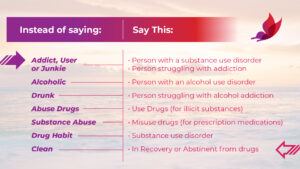Should I Talk to My Loved One About Their Addiction?
Many people wonder whether they should talk to a loved one about their addiction. Substance use disorder (SUD) can be a challenging topic to navigate. It’s difficult seeing someone you care about experience an addiction to drugs or alcohol and deciding to talk to them about it can feel intimidating. You may worry that confronting them will make the problem worse or hurt your relationship, but ignoring their addiction can be significantly more damaging. In order to have a productive discussion with someone you believe may have a SUD, you must approach the subject at the right time and do so in a compassionate, calm manner.
Preparing for the Conversation
Prior to initiating conversation, ensure you have educated yourself on SUDs. Although you cannot fully understand what they are going through, putting in the effort to learn will show them you genuinely care. The first step to this process is to unlearn and distance yourself from any harmful stereotypes or language surrounding SUDs. Addiction is a disease and your loved one is not a bad person for suffering from it.
Spend some time researching possible treatment options in case they decide they’re ready to seek treatment, but prepare yourself for them to react negatively; they might not be ready to start recovery or may deny having a SUD.
Start the Conversation
The sooner you have the discussion, the better; don’t wait for your loved one to hit rock bottom before trying to help. That being said, avoid having the conversation when they are high or drunk. Being under the influence of drugs or alcohol could make them less receptive to your concerns, so make sure they are sober and in a stable frame of mind. Set up a specific time for you to talk privately, making sure it does not feel like an ambush.
How To Ask Someone to Go to Rehab
Asking someone to seek treatment for addiction begins with determining what type of treatment would be most beneficial and gathering all the information you can. Keep this information on hand in case they decide they are ready to get treatment. Approach the conversation gently and avoid using potentially upsetting language or tones. Express your concern, share the information you found on your own, and offer to help them conduct their own research as well. They may feel they don’t need treatment, or may admit they need it, but express feelings of fear or anxiety about actually making those moves.
Here are some examples of ways to offer encouragement and share resources:
- “I found some information on a program I think you would do great in.”
- “I care about you and want you to be healthy.”
- “Let’s look into some local support groups. I’ll even take you there if you want.”
- “I’m concerned about you and I think rehab or therapy would help you get better.”
- “There is nothing wrong with admitting you need treatment.”
- “I’m here for you every step of the way.”
What Do I Say to Someone With an Addiction?
In sensitive situations such as this, it’s best to listen more than you talk in order to create a safe space for them. Begin with calmly expressing your concern without placing blame or making accusations, threats and ultimatums. Gently explain why you believe they may have a SUD. Give specific examples of concerning situations or behavior you’ve witnessed and utilize what you learned from your research, then give them space to respond.
Expressing your personal feelings about the subject is often beneficial. Phrasing your concerns like “I feel” helps avoid placing blame but still provides insight into how their addiction affects their own loved ones. . Focus on your own observations of them by saying something along the lines of, “I feel like you haven’t been yourself lately, so I wanted to check in on you.” This kind of gentle approach can often act as motivation for people with SUDs to get treatment
It is important to be mindful of your tone as well as your specific language and avoid using dehumanizing, reductive terms such as “addict,” “user” or “junkie.”

If They’re Not Ready for Help
Sometimes, no matter how receptive they seem and how well the conversation went, your loved one may not feel ready to seek treatment. Try not to take this personally. Remember that addiction is a disease; it is not as simple as them “choosing drugs over you.”
It’s okay to express how you feel about their decision, but try your best not to get angry or shame them. Even if you disagree with them, it’s important to withhold your judgment. Offer them your support and share resources for treatment and support groups, but avoid pressuring them to seek it out.
If They Are Ready for Help
If your loved one is exhibiting symptoms of withdrawal when they reduce or cease use of a substance, has an increased tolerance, or experiences intense cravings, a detoxification, often called detox, may be necessary. It is not recommended to quit “cold turkey” or detox on your own, so search for detox centers near you to help them find a safe, controlled environment.
Sometimes a detox is not necessary; in these cases, direct inpatient (residential) or outpatient (non-residential) treatment is possible. Whether an inpatient or outpatient program is more appropriate depends on the substance being used, the severity of their addiction, and whether they have co-occurring physical or mental health conditions. Twelve-step programs like Alcoholics Anonymous and other local support groups are also an option for those in the beginning stages of recovery.
Recovery often begins with an evaluation by a medical professional to determine the best course of treatment. Offer to drive them to this appointment, or sit with them while they make calls to treatment centers.
Signs Your Loved One May Have a Substance Use Disorder
Physical
- Bloodshot eyes
- Deterioration of physical appearance or personal grooming habits
- Pupils appearing larger or smaller than usual
- Frequent runny nose or sniffling not due to a cold
- Sudden weight gain or loss
- Tremors
- Unusual odors on breath, body or clothing
Behavioral
- Bragging about drinking or using drugs
- Changes in appetite
- Changes in sleep patterns
- Engaging in secretive or suspicious behaviors
- Frequently getting into legal trouble
- Increased drug tolerance
- Interest only in going to parties or places where alcohol or other drugs are available
- Neglecting responsibilities at work, school or home
- Secretive or withdrawn behavior
- Slurred speech
- Sudden change in friends, favorite hangouts and hobbies
- Unexplained need for money or financial problems.
Psychological
- Appearing fearful, anxious or paranoid
- Lack of motivation
- Periods of unusual increased energy
- Sudden mood swings
- Unexplained change in personality
If you or a loved one are exhibiting signs of a substance use disorder, the recovery specialists at Landmark Recovery are available 24/7 to help you begin living a life free of addiction. Call (865) 448-5174 or find a location near you.

Choose Recovery Over Addiction
We're here 24/7 to help you get the care you need to live life on your terms, without drugs or alcohol. Talk to our recovery specialists today and learn about our integrated treatment programs.




